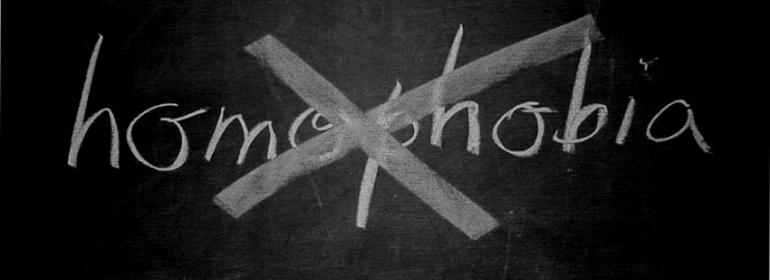While Rory O’Neill might have been right to call out homophobia on The Saturday Night Show, we should be very careful about how and when we use the ‘H Word’, says Rob Buchanan.
There is a great risk to the cause of gay rights by bandying about the term, homophobia. Yes, there are some very valid instances where homophobia is a clear-cut issue and should be named – when people say all gay men are predatory paedophiles, for instance, or that LGBT people are unfit parents, or unworthy of equal rights in marriage.
But I’m sure many of us have heard the careless use of the ‘H word’ by self-righteous or immature gays, who label people homophobes because they disagree with their opinions, or because they were unwilling to accept valid criticisms. And let’s not forget the ‘cry wolf’ abuse of the word in the workplace, or in small claims courts, when the validity of our very real struggle for equality is diminished by people playing the gay card in their own defence.
I applaud Rory O’Neill calling out the people he did for having homophobic opinions on The Saturday Night Show, but in order for discourse to progress we must remember there is a subtle difference between using homophobic language or entertaining homophobic opinions, and being an out-and-out homophobe.
Of course, the place we see homophobic language the most is the Internet, which has become a hotbed for people who entertain homophobic opinions to anonymously give them free reign. Few things sound as virtuous as the goals of online anti-homophobia hate speech campaigns, e.g. to prevent the kind of sickening homophobic venom that’s spat out all over Internet and protect people from being victimised. We imagine it might be a virtuous shield against bullying and intimidation, and that can’t be bad, right? Unfortunately, anti-homophobic hate speech campaigns are a road to hell, paved with the greatest of intentions.
Bullying destroys individuals’ lives and paralyses minorities. It poisons minds and has the ability to inflame and unite people in prejudice. However some of the anti-homophobic hate speech campaigns are simply censorship masquerading as a preventative measure.
Censorship of and for adults doesn’t anger me as much as it terrifies me. In our crusade to eradicate what displeases or offends us we risk sleepwalking our way in to an Orwellian nightmare of restricted thought and expression, until we find the protective barriers we put up have become a prison of our own making. With each passing day the definition of ‘acceptable’ vocabulary will become narrower, until we are left with little room for manoeuvre and a shrinking collection of safe ‘newspeak’ expressions.
Who really benefits from a society forced to hide its true feelings about gays, full of superficial tolerance that masks the real feelings of its citizens? Kept hidden, these feelings are outside the realms of discourse, so the lies and fantasy that so much homophobia is based upon become no longer subject to disproval.
The ultimate flaw in being too quick in labeling as homophobic anything which contradicts our idea of tolerance is that it doesn’t seek to change why people say things, only what they say. However silenced, the motivations for these intolerant beliefs are still in play.
Only through the presentation of intelligent counter-arguments can we defend ourselves in a way that works to solve the problem of homophobia rather than shove it under the carpet. Allowing the bigots to stick their heads above the parapet, allows us to challenge them, and much of the rhetoric of homophobia is so transparently juvenile, it seldom stands up to adult scrutiny.
I heartily agree that we should name homophobia for what it is, and I commend Rory O’Neill for doing so. But for all our sakes we shouldn’t censor the homophobes. Instead, we should confront them.
In the coming years there will be great political and moral challenges to queers in Ireland. We need to develop the weapons in our arsenal, to re-learn why homophobia is wrong, not just regurgitate the fact that it is. We need to learn what it feels like to be offended, to be able to articulate how it makes us feel, and present an argument to the contrary.
_____
This is a response to Brian Finnegan’s piece The H Word.
© 2014 GCN (Gay Community News). All rights reserved.
